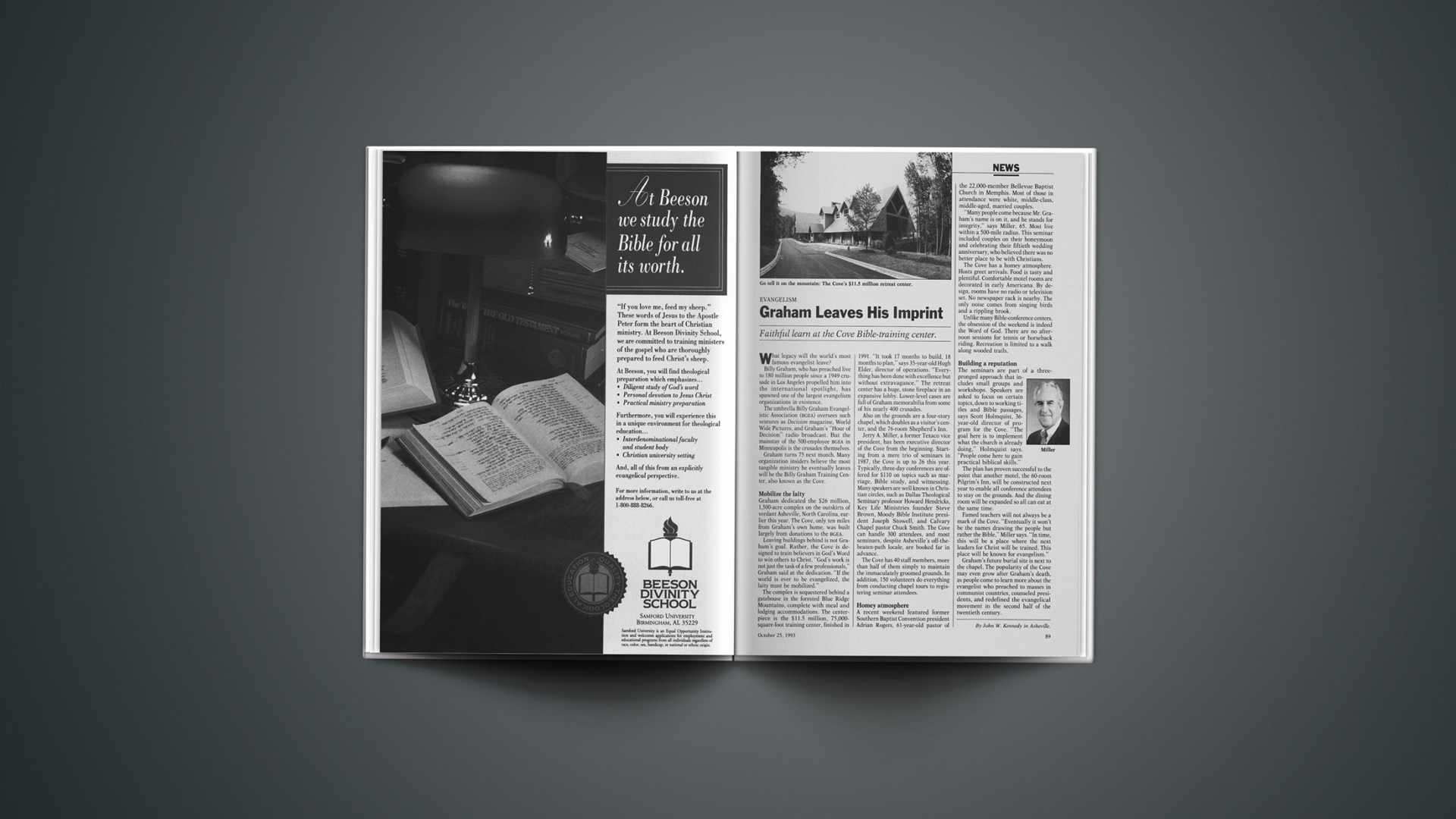Faithful learn at the Cove Bible-training center.
What legacy will the world’s most famous evangelist leave?
Billy Graham, who has preached live to 180 million people since a 1949 crusade in Los Angeles propelled him into the international spotlight, has spawned one of the largest evangelism organizations in existence.
The umbrella Billy Graham Evangelistic Association (BGEA) oversees such ventures as Decision magazine, World Wide Pictures, and Graham’s “Hour of Decision” radio broadcast. But the mainstay of the 500-employee BGEA in Minneapolis is the crusades themselves.
Graham turns 75 next month. Many organization insiders believe the most tangible ministry he eventually leaves will be the Billy Graham Training Center, also known as the Cove.
Mobilize the laity
Graham dedicated the $26 million, 1,500-acre complex on the outskirts of verdant Asheville, North Carolina, earlier this year. The Cove, only ten miles from Graham’s own home, was built largely from donations to the BGEA.
Leaving buildings behind is not Graham’s goal. Rather, the Cove is designed to train believers in God’s Word to win others to Christ. “God’s work is not just the task of a few professionals,” Graham said at the dedication. “If the world is ever to be evangelized, the laity must be mobilized.”
The complex is sequestered behind a gatehouse in the forested Blue Ridge Mountains, complete with meal and lodging accommodations. The centerpiece is the $11.5 million, 75,000-square-foot training center, finished in 1991. “It took 17 months to build, 18 months to plan,” says 35-year-old Hugh Elder, director of operations. “Everything has been done with excellence but without extravagance.” The retreat center has a huge, stone fireplace in an expansive lobby. Lower-level cases are full of Graham memorabilia from some of his nearly 400 crusades.
Also on the grounds are a four-story chapel, which doubles as a visitor’s center, and the 76-room Shepherd’s Inn.
Jerry A. Miller, a former Texaco vice president, has been executive director of the Cove from the beginning. Starting from a mere trio of seminars in 1987, the Cove is up to 26 this year. Typically, three-day conferences are offered for $110 on topics such as marriage, Bible study, and witnessing. Many speakers are well known in Christian circles, such as Dallas Theological Seminary professor Howard Hendricks, Key Life Ministries founder Steve Brown, Moody Bible Institute president Joseph Stowell, and Calvary Chapel pastor Chuck Smith. The Cove can handle 300 attendees, and most seminars, despite Asheville’s off-the-beaten-path locale, are booked far in advance.
The Cove has 40 staff members, more than half of them simply to maintain the immaculately groomed grounds. In addition, 150 volunteers do everything from conducting chapel tours to registering seminar attendees.
Homey atmosphere
A recent weekend featured former Southern Baptist Convention president Adrian Rogers, 61-year-old pastor of the 22,000-member Bellevue Baptist Church in Memphis. Most of those in attendance were white, middle-class, middle-aged, married couples.
“Many people come because Mr. Graham’s name is on it, and he stands for integrity,” says Miller, 65. Most live within a 500-mile radius. This seminar included couples on their honeymoon and celebrating their fiftieth wedding anniversary, who believed there was no better place to be with Christians.
The Cove has a homey atmosphere. Hosts greet arrivals. Food is tasty and plentiful. Comfortable motel rooms are decorated in early Americana. By design, rooms have no radio or television set. No newspaper rack is nearby. The only noise comes from singing birds and a rippling brook.
Unlike many Bible-conference centers, the obsession of the weekend is indeed the Word of God. There are no afternoon sessions for tennis or horseback riding. Recreation is limited to a walk along wooded trails.
Building a reputation
The seminars are part of a three-pronged approach that includes small groups and workshops. Speakers are asked to focus on certain topics, down to working titles and Bible passages, says Scott Holmquist, 36-year-old director of program for the Cove. “The goal here is to implement what the church is already doing,” Holmquist says. “People come here to gain practical biblical skills.”
The plan has proven successful to the point that another motel, the 60-room Pilgrim’s Inn, will be constructed next year to enable all conference attendees to stay on the grounds. And the dining room will be expanded so all can eat at the same time.
Famed teachers will not always be a mark of the Cove. “Eventually it won’t be the names drawing the people but rather the Bible,” Miller says. “In time, this will be a place where the next leaders for Christ will be trained. This place will be known for evangelism.”
Graham’s future burial site is next to the chapel. The popularity of the Cove may even grow after Graham’s death, as people come to learn more about the evangelist who preached to masses in communist countries, counseled presidents, and redefined the evangelical movement in the second half of the twentieth century.
By John W. Kennedy in Asheville.









